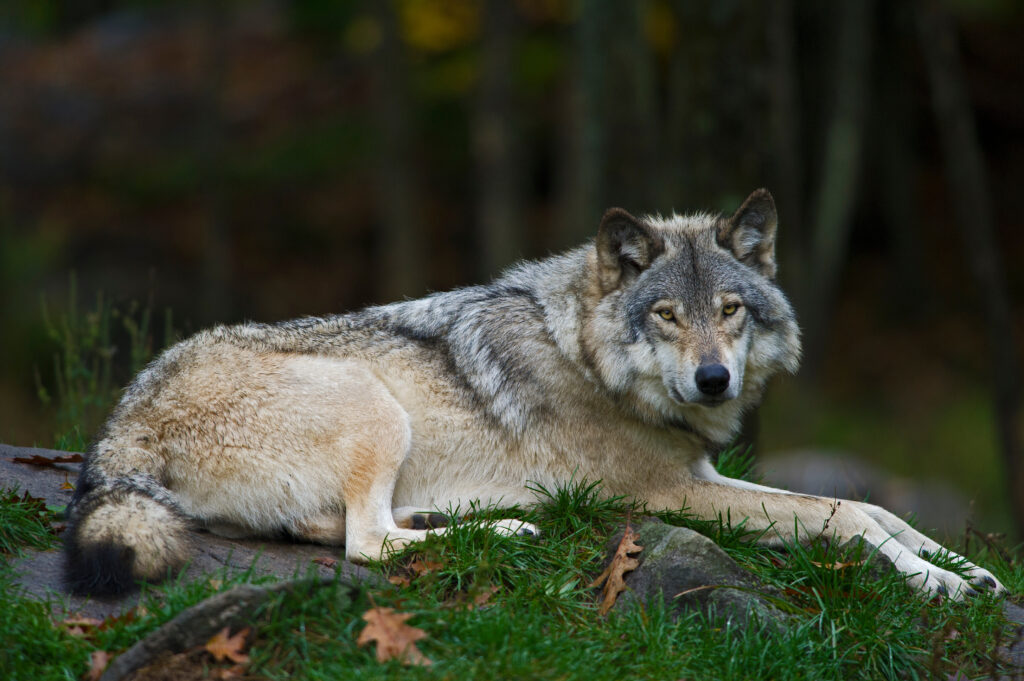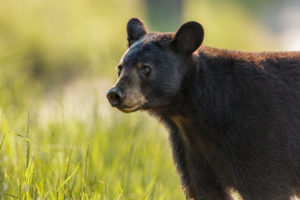Cull of the Wild
A new bill threatens to bring Washington’s long, bipartisan war on wolves to a bloody close. North American gray wolf behind tree
North American gray wolf behind tree
In 2011, Sen. Jon Tester of Montana was facing an upstart challenger, and to keep his seat and maintain a majority in the Senate, the Democratic leadership offered up a sacrifice: the gray wolf.
Placing an iconic North American mammal on the altar of partisan politics was a calculation born out of the cauldron of hatred and loathing produced in the American West by the 1973 Endangered Species Act, which empowered the federal government to protect wolves from livestock ranchers bent on their destruction. Ranchers, who believed that predators would decimate their herds, never forgave the feds for the ESA. Across the rural West, the wolf became a symbol of federal oppression.
Convinced that Tester’s pro-wolf stance was the only thing standing between him and another term in office, the Democrats banded together for a behind-the-scenes campaign to speed the wolf’s removal from the list of protected species in the Northern Rocky Mountains. To prove his mettle, Tester teamed up with Mike Simpson, the Republican congressman from Idaho, a state dominated by livestock interests. Joined in cynical opportunism, the two lawmakers snuck a delisting rule into the federal budget bill via a last-minute legislative rider.
The rider passed in April 2011, signed by President Barack Obama, and Tester won reelection the next year. The Democrats had held their sacrosanct majority, but at the cost of undermining the ESA. Legalizing the slaughter of wolves in Idaho and Montana, the wolf delisting was a daring maneuver that no lawmaker had attempted in the nearly 40 years since passage of the ESA. Prior to 2011, the U.S. Fish and Wildlife Service had sole purview over delisting, based on evidence marshaled by its staff scientists. For the first time, Congress had decided on what species should be protected and which should be thrown, well, to the wolves.
The Democrats banded together for a behind-the-scenes campaign to speed the wolf’s removal from the list of protected species in the Northern Rocky Mountains.
If imitation is the sincerest form of flattery, Colorado Republican Lauren Boebert’s latest bill, ironically named the “Trust the Science Act,” is a grand homage to the Obama-Tester betrayal. Her legislation would expand the delisting of the gray wolf across the United States. (The delisting in 2011 only applied to wolf packs in Montana, Idaho and Wyoming.) The bill is supported by hard-right Republicans from the Northern Rocky Mountain states and the Dakotas, as well as a small group of Democrats, including Henry Cuellar of Texas, Yadira Caraveo of Colorado, Marie Gluesenkamp Perez of Washington and Jared Golden of Maine. Boebert’s draconian program of wolf delisting is in keeping with the broader right-wing agenda expressed in Project 2025, the infamous 920-page “presidential transition” blueprint that includes plans to gut the Endangered Species Act.
As with the Tester bill, Boebert’s “Trust the Science Act” stands contrary to the research and recommendations of the wildlife conservationist community, which unanimously rejects the claim that wolves need to be hunted to be managed.
“There is absolutely no biological reason for killing wolves,” ecologist and author George Wuerthner told me recently. The rare exceptions, he says, are when a predator has become so habituated to humans that it aggresses on people for human food. Wuerthner sees wolves and other predators not as undesirable interlopers but as critical agents of a delicate ecological balance. “They have a right to live without significant human interference,” he said.
Targeting predators often has opposite effects of what’s intended by disrupting their critical role in maintaining ecological integrity. “In many cases, predator control backfires since it can lead to greater production of young to compensate for losses,” Wuerthner told me. “A population of young animals is more likely to cause conflicts with humans.” Killing random wolves creates “social chaos” that upends the social hierarchy, increasing the chance that inexperienced wolves will target livestock.

Wuerthner has argued that ranchers can manage coexistence with predators by acting with proper vigilance. Rapid removal of dead carcasses from rangelands, corralling cattle at night, the construction of electric fencing and the use of herders, among other measures, have been proven to significantly reduce predator losses.
The data on livestock loss, meanwhile, has been greatly exaggerated for political purposes. “Given the hysteria generated by the livestock industry,” writes Wuerthner, “one might think that the entire western livestock operations were in jeopardy from wolf predation.”
Nothing could be further from the truth. The Humane Society has analyzed livestock data from the U.S. Deptartment of Agriculture and found that “farmers and ranchers lose nine times more cattle and sheep to maladies [such as] weather, birthing problems and theft than to all predators combined.” Wolves, it turns out, are responsible for less than 1% of cattle and sheep losses.
As Rep. Don Beyer, D-Va., pointed out in a floor debate in Congress last April, rescinding protections for wolves has led to overhunting and the return of the same conservation issues that prompted ESA protection in the first place. “We’re in the midst of a biodiversity crisis,” Beyer told his fellow lawmakers last April. “We should be supporting current scientific efforts by fully funding the agencies that carry out ESA extinction preservation work.”
According to federal agencies, there are three reasons for delisting: the species has recovered and no longer needs to be protected; there is new evidence suggesting that the species is not endangered; or, in the worst-case scenario, the species has gone extinct. In 2013, for example, the Steller sea lion was delisted because it had been deemed to have recovered sufficiently, while the canary rockfish of the Puget Sound was delisted in 2017 because it did not meet the criteria of being a species. The Caribbean monk seal, sadly, was delisted in 2008 because not a single individual has been spotted since 1952.
Killing random wolves creates “social chaos” that upends the social hierarchy, increasing the chance that inexperienced wolves will target livestock.
In the Northern Rockies, gray wolves are already probably on an extinction path. Idaho, Wyoming and Montana — taking full advantage of the Tester-Obama law — have hired trappers to lay down thousands of new traps. Idaho has contracted with the dystopian-sounding Predator Control Corporation to do its dirty work, including shooting defenseless wolves from airships. Montana encourages night hunting and shooting over bait.
In response to the ramping up of wolf hunting, Wilderness Watch and nine conservation groups filed a lawsuit in April against the U.S. Fish and Wildlife Service, charging the Biden administration with complicity in the “war on wolves” by allowing the slaughter to proceed. “It’s unfortunate that citizens have to turn to the courts,” said George Nickas, executive director of Wilderness Watch. “Like their state counterparts, federal officials have lost all reverence or respect for these iconic wilderness animals.”
Rather than primary targets, Nickas considers wolves to be proxies for “environmentalists and animal lovers.” If the animal is a casualty in a broader cultural war, there is a special poignancy to the loss. In his book “Among Wolves,” Gordon Haber, who studied Alaskan packs for more than 40 years, notes wolves’ “unusual intelligence, emotional depth, expressiveness, sensory abilities, physical prowess and family-based social systems.”
More than a decade after Tester’s bill became law, his cold political calculus seems to have been correct, even if it brought the gray wolf to the current precipice. The Montana lawmaker remains a stalwart in the Senate, the ultimate blue-dog Dem survivor in a state turning ever rightward. He continues to be well rewarded by ranchers, with almost $100,000 in livestock industry contributions, the third-most in Congress behind Sen. Ted Cruz and House Republican August Pfluger, both Texas Republicans. If wolves had a lobby group, however, they would want him fed to the last of the Montana packs roving the Montana wilderness.
Dig, Root, GrowThis year, we’re all on shaky ground, and the need for independent journalism has never been greater. A new administration is openly attacking free press — and the stakes couldn’t be higher.
Your support is more than a donation. It helps us dig deeper into hidden truths, root out corruption and misinformation, and grow an informed, resilient community.
Independent journalism like Truthdig doesn't just report the news — it helps cultivate a better future.
Your tax-deductible gift powers fearless reporting and uncompromising analysis. Together, we can protect democracy and expose the stories that must be told.
This spring, stand with our journalists.
Dig. Root. Grow. Cultivate a better future.
Donate today.








You need to be a supporter to comment.
There are currently no responses to this article.
Be the first to respond.